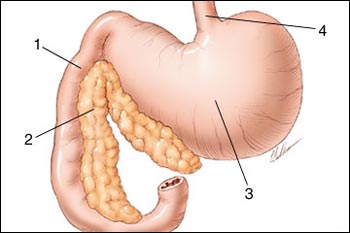Canine
Pancreatitis
Dogs and cats. Middle-aged to older female dogs are more likely to be affected by pancreatitis than other dogs. Dog breeds with a higher incidence of the disease include the miniature poodle, cocker spaniel, and miniature schnauzer. Pancreatitis is more difficult to diagnose in cats than in dogs.
Canine pancreatitis is a potentially life-threatening disease that more commonly affects middle-aged to older female dogs. The pancreas is a gland that functions as part of the digestive process by producing enzymes that help break down food. Unfortunately, if these enzymes become activated within the gland, the pancreas begins digesting its own glandular tissue, creating inflammation, or pancreatitis.

- Duodenum
- Pancreas
- Stomach
- Esophagus
Typical symptoms include vomiting, loss of appetite, and abdominal pain, but sometimes signs can be more mild or vague. The severity of the disease and response to treatment will vary from case to case. Animals with severe disease may die either from complications or lack of response to treatment.
Diagnosis and treatment are aimed at identifying and eliminating any underlying causes of pancreatitis. The disease is best prevented by correcting obesity, ensuring that the animal does not eat high-fat foods, and preventing other conditions associated with pancreatitis.














